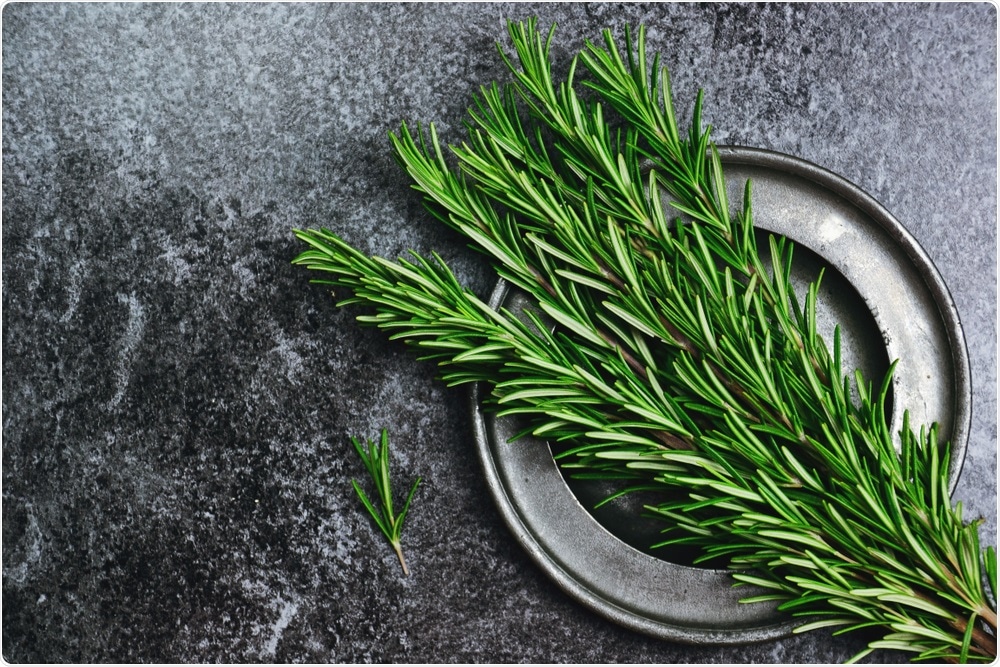Scripps Research scientists have discovered evidence that a chemical present in rosemary, the medical and culinary herb, might be a two-pronged weapon against the SARS-CoV-2 coronavirus, which is the cause of COVID-19.

Image Credit: topotishka/Shutterstock.com
The researchers discovered that the compound, carnosic acid, can curb the interaction between the SARS-CoV-2 outer “spike” protein and the receptor protein, ACE2, which the virus utilizes to gain access into cells. The result was published on January 6th, 2022, in the journal Antioxidants.
The researchers also provided data, as well as evidence from previous studies, showing carnosic acid’s distinct impact in suppressing a potent inflammatory pathway, which is active in severe COVID-19 as well as other diseases such as Alzheimer’s.
We think that carnosic acid, or some optimized derivative, is worth investigating as a potentially cheap, safe, and effective treatment for COVID-19 and some other inflammation-related disorders.”
Stuart Lipton, Study Senior Author and Professor, Step Family Foundation Endowed Chair, Department of Molecular Medicine, Scripps Research Institute
Stuart Lipton MD, PhD, is the founding co-director of the Neurodegeneration New Medicines Center.
Lipton and colleagues discovered evidence that carnosic acid triggers an anti-inflammatory, antioxidant signaling cascade known as the Nrf2 pathway and decreases Alzheimer's-like symptoms in mice models of the disease, which is known to involve brain inflammation, in the research conducted in 2016.
Lipton, along with Chang-ki Oh, PhD, and Dorit Trudler, PhD, a staff scientist and postdoctoral fellow, respectively, in the Lipton lab, and first author Takumi Satoh, PhD, of the Tokyo University of Technology, explained their further studies of this anti-inflammatory effect on the immune cells that drive inflammation in COVID-19 and Alzheimer’s disease for a new study.
The researchers also looked at data from other studies that showed that carnosic acid can reduce inflammation in various disease models. Scientists postulated that this impact might be advantageous against the inflammation seen in COVID-19 and some cases of prolonged COVID, a post-COVID condition characterized by cognitive impairments commonly referred to as “brain fog.”
The researchers also disclosed a COVID-19 infection-blocking experiment carried out by Oh. He demonstrated that carnosic acid may directly inhibit SARS- CoV-2’s capacity to infect cells using a standard infectivity test, with progressively stronger infection-blocking effectiveness at higher dosages.
Despite being a harmless and generally unreactive chemical, carnosic acid has this antiviral impact, according to the researchers, because it is transformed to its active form by the inflammation and oxidation occurring at infection sites. They believe that in its active state, the chemical alters the ACE2 receptor for SARS-CoV-2, rendering it impermeable to the virus and thereby preventing infection.
Carnosic acid represents a ‘pathologically activated therapeutic’ in preclinical models of disease —inactive and innocuous in its normal state, but converted to an active form where it needs to be active.”
Stuart Lipton, Study Senior Author and Professor, Step Family Foundation Endowed Chair, Department of Molecular Medicine, Scripps Research Institute
Lipton and his colleagues are currently collaborating with Scripps Research chemists, notably Phil Baran and Ben Cravatt, professors in the Department of Chemistry, to develop and test more powerful carnosic acid derivatives with enhanced pharmacological properties for application in inflammation-related illnesses.
Patents for the use of carnosic acid derivatives in the treatment of degenerative disorders are held by Lipton and Satoh.
Source:
Journal reference:
Satoh, T., et al. (2022) Potential Therapeutic Use of the Rosemary Diterpene Carnosic Acid for Alzheimer’s Disease, Parkinson’s Disease, and Long-COVID through NRF2 Activation to Counteract the NLRP3 Inflammasome. Antioxidants. doi.org/10.3390/antiox11010124.